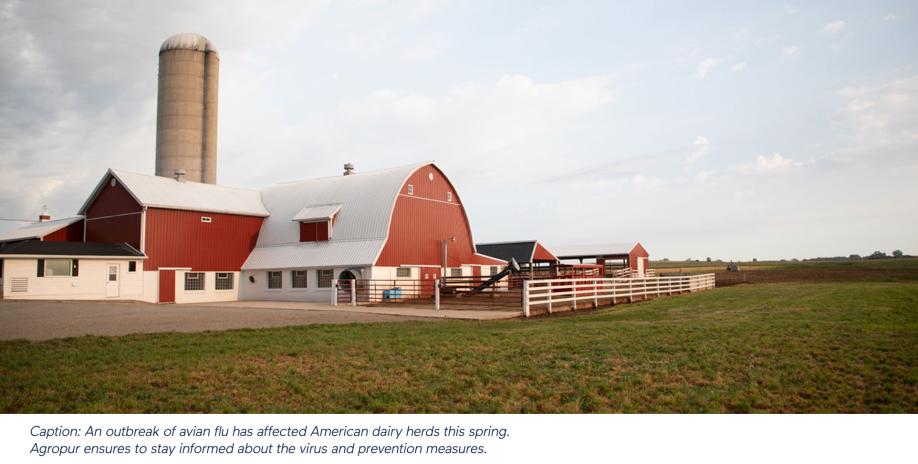Avian Flu: Reacting Quickly to the Situation

The discovery of avian influenza cases in dairy cattle in the United States preoccupied the dairy industry this spring. At Agropur, our experts worked quickly to assess the situation and establish protocols to ensure the safety and quality of our products.
The first reports of highly pathogenic avian influenza (HPAI) in dairy cows appeared in March in the southern United States, and tests have since confirmed its presence in herds in at least nine states. At the time of writing, avian influenza has not been detected in Canada.
The Scientific Team at Work
An Agropur committee, made up of managers from several departments, continues to closely monitor new developments and assess the potential impact on our activities. When the first cases hit the headlines, Agropur's scientists were quick to identify measures needed to ensure product integrity and prevent the disease from spreading.
This was the case for Michel Pouliot, Agropur's Chief Scientist, who sought the advice of leading university researchers in the USA and Canada. " We had to qualify the risks, including those related to food security and the milk procurement for our activities," he explains. " The message we received was reassuring: the virus is heat-sensitive and, once pasteurized, the milk is safe to drink."
The Cooperative also looked at what its teams could do to reduce risks after the milk had left the farm. The experts consulted indicated that the cleaning procedures already used in the raw milk reception areas of our plants are very effective in killing the virus, adds Julie Audy, Agropur's Director of Food Safety and a member of our Quality Management Committee.
Michel Pouliot believes that the many lessons learned from our recent experience with COVID-19 provided Agropur with a good roadmap for managing the rapidly evolving situation. Everything is in place to continue offering consumers healthy, quality products.
A Rare Phenomenon
Although it is rare for HPAI to affect dairy cows, the situation was not totally unexpected. As the U.S. Department of Agriculture (USDA) has been tracking avian influenza in mammals for years, public health officials and veterinarians have been preparing for this eventuality, according to the International Dairy Foods Association (IDFA).
In particular, the Agropur team is working with decision-makers in Quebec and the Atlantic region to assess the situation. " In Quebec, a cattle expert committee - beef and dairy cows - was already in action to prepare for serious pandemics and limit the risks should they occur," explains Claudine Martel, Strategic Advisor, Corporate Affairs for Agropur. " The committee's work will focus on HPAI in the event of an outbreak in the country."
Although no cases have been reported in Canada, communication channels between the various dairy industry partners are open so that everyone has access to the latest information. When a notifiable disease is declared on a farm, the ministry notifies the milk producer boards to ensure that milk trucks are directed to plants that pasteurize. The mechanisms already exist," continues Claudine Martel. “They have been developed over several years to prevent contagion between farms."
Biosafety During On-farm Interventions The Cooperation Team is trained to avoid becoming a vector for pathogen transmission and is doubly vigilant on every visit to the farm. This includes wearing single-use protective equipment and disinfecting equipment after each intervention. If there is a health issue at your farm, please notify your advisor before your visit.
|
Credit to Dairy Producers
Although the government played an important role, Julie Audy believes that producers deserve the credit for slowing the spread of the disease among cattle.
" It's really due to the biosecurity measures put in place on the farm and the proactivity of farmers," she points out.
Agropur's U.S. milk supply team quickly put in place protocols to ensure the safety of milk supplies accessed by the Cooperative's seven U.S. plants. It asked its suppliers to increase the level of control on their farms to limit contamination, and to report any signs of illness immediately.
In the USA, plants in Jerome, Idaho, and Lake Norden, South Dakota - states where cases of contamination by the virus have been confirmed - have implemented increased cleaning protocols in their raw milk reception areas to provide an extra layer of defense. Armed with this expertise, the Cooperative's Canadian plants will be ready should there be any problematic cases north of the border.
If you have any questions about avian flu, please contact your provincial milk marketing board or your veterinarian.
NEXT NEWS
Michel Lemire 1937-2024 – Agropur Mourns One of Its Great Builders
Michel Lemire, a key player in Agropur’s 85-year history, died on April 23 at 86. Learn about some of his achievements.


